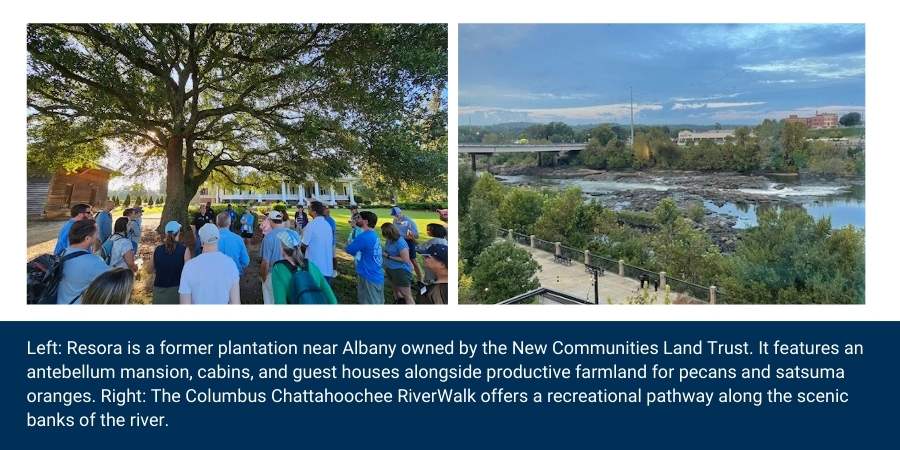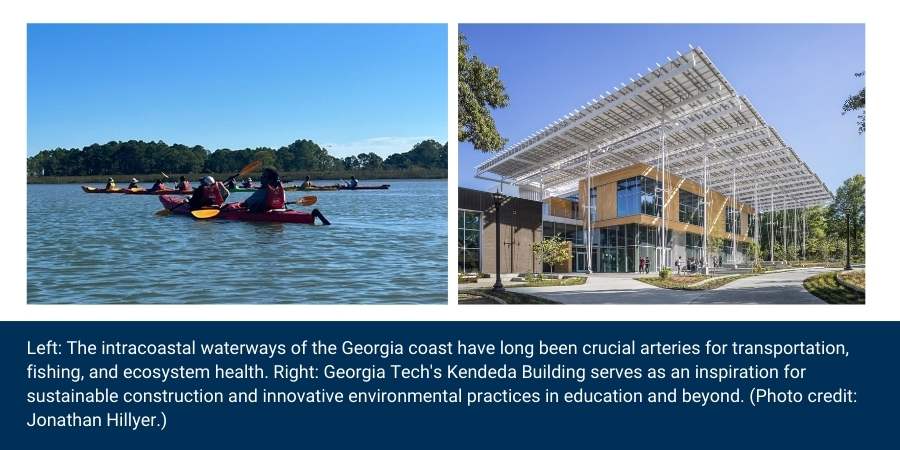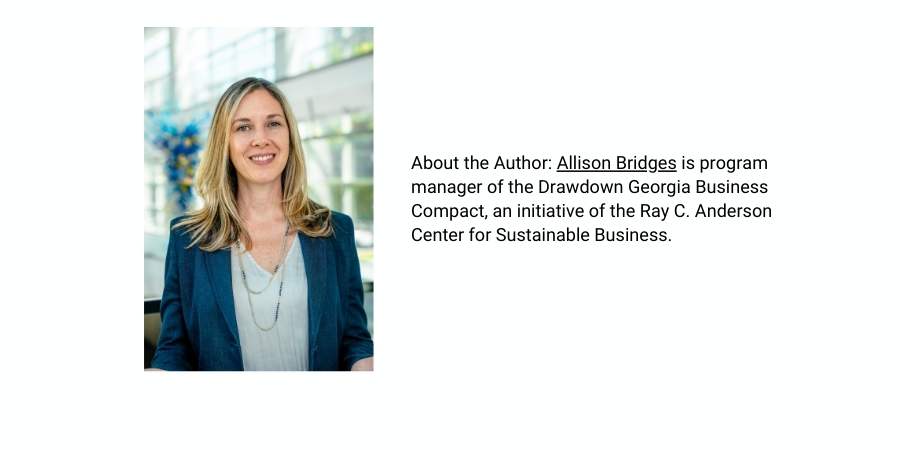Sitting along the serene banks of North Georgia’s Amicalola Creek, a name derived from the Cherokee word for “tumbling waters,” it was easy to imagine what the pristine wilderness must have looked like before expansive settlement. Cooled by a spring breeze, I listened to a biologist from the Georgia Department of Natural Resources describe the immense aquatic biodiversity of the Coosa River Basin. This is how I began my journey, in the spring 2023, as a Class of 2023 participant with the Institute for Georgia Environmental Leadership (IGEL). I had no idea then just how rewarding my journey around the state would be over the course of the coming year.
IGEL is an inclusive, hands-on program in which anyone from academia, business, government, advocacy, or the public can take part in experiential environmental leadership training. The yearlong program includes five, three-day sessions that offer challenging outdoor experiences and constructive dialogue on Georgia’s most pressing environmental issues.
Following our introductory session in North Georgia where we dove into talks on environmental history and conservation, as well as leadership mainstays like personality tests, the second session brought us to South Georgia. To learn more about the natural resource-based economy of the region and to gain a deeper understanding of the importance of water policy, our home base for the second session was the impressive 29,000-acre property of The Jones Center at Ichauway. With its origins as the quail hunting reserve of Robert W. Woodruff, the long-term chairman of The Coca-Cola Company, the center now serves as a research and educational facility dedicated to the conservation and study of natural resources and ecosystems in South Georgia. As we made our way across the tapestry of small towns, farms, and forests, the sweltering mid-summer heat was a constant reminder of the fortitude of our farming communities as well as the enslaved people whose labor helped build the legacy of the South’s agricultural economy.  We visited Resora, a 1,600-acre former plantation that was previously owned by one of the largest slaveholder estates in Georgia. Resora promotes racial reconciliation in the region while maintaining a working farm, retreat, and on-site learning opportunities. A talk by Shirley Sherrod, co-founder of Resora and the New Communities Land Trust, was a highlight of the year as she spoke of her time as a land collective activist during the civil rights movement. Her inspiring work led to numerous historical firsts, including settlement of one of the largest class action lawsuits against the United States Department of Agriculture (USDA) over discriminatory loan practices, and her service as the first Black USDA Georgia director of rural development.
We visited Resora, a 1,600-acre former plantation that was previously owned by one of the largest slaveholder estates in Georgia. Resora promotes racial reconciliation in the region while maintaining a working farm, retreat, and on-site learning opportunities. A talk by Shirley Sherrod, co-founder of Resora and the New Communities Land Trust, was a highlight of the year as she spoke of her time as a land collective activist during the civil rights movement. Her inspiring work led to numerous historical firsts, including settlement of one of the largest class action lawsuits against the United States Department of Agriculture (USDA) over discriminatory loan practices, and her service as the first Black USDA Georgia director of rural development.
Our third session took place in early fall as we explored the transformative redevelopment of the Columbus waterfront Mill District, which has brought new recreational, cultural, and economic opportunity to the historic city. Through collaboration and strategic investment, derelict industrial sites were revitalized into scenic parks, green spaces, and pedestrian-friendly promenades. To deepen our understanding of the challenges of collaboration and the potential social impacts of increasing land value, we had the opportunity to hear from people driving neighborhood revitalization efforts including the inspiring affordable housing work of NeighborWorks Columbus.  Another highlight of the year was our stunning late-fall stay on Sapelo Island, a true treasure of the Georgia coast. Over a packed three days, we learned about the unique coastal marsh ecology, environmental policy, and the complex development pressures facing the local Gullah community of Hogg Hummock. The session shed light on the competing visions of the coast and the dynamics of coastal decision making.
Another highlight of the year was our stunning late-fall stay on Sapelo Island, a true treasure of the Georgia coast. Over a packed three days, we learned about the unique coastal marsh ecology, environmental policy, and the complex development pressures facing the local Gullah community of Hogg Hummock. The session shed light on the competing visions of the coast and the dynamics of coastal decision making.
The culminating winter session was a call to action that richly paralleled my work as a program manager for the Drawdown Georgia Business Compact. Our class was asked to read two books by Paul Hawken: Drawdown and The Ecology of Commerce. Both books have a connection to the work of the Ray C. Anderson Center for Sustainable Business and the multi-university initiative Drawdown Georgia. Hawken’s work was an inspiration to Ray C. Anderson himself, and it continues to inspire and inform the foundation established to continue his legacy. Our class discussions focused on the imperative and great potential for meaningful action within the business community.  The final session also explored pioneering initiatives such as the Georgia Tech Kendeda Building, New City Properties along the Atlanta Beltline, and Serenbe in Chattahoochee Hills, to understand the people at the forefront of integrating eco-friendly practices and innovative design concepts into their projects. Although each development confronted various challenges such as navigating complex regulatory frameworks, managing higher upfront costs associated with sustainable technologies, overcoming skepticism, and working to mitigate negative impacts such as gentrification, they all ultimately reshaped how we imagine a future where we break from the status quo to drive change.
The final session also explored pioneering initiatives such as the Georgia Tech Kendeda Building, New City Properties along the Atlanta Beltline, and Serenbe in Chattahoochee Hills, to understand the people at the forefront of integrating eco-friendly practices and innovative design concepts into their projects. Although each development confronted various challenges such as navigating complex regulatory frameworks, managing higher upfront costs associated with sustainable technologies, overcoming skepticism, and working to mitigate negative impacts such as gentrification, they all ultimately reshaped how we imagine a future where we break from the status quo to drive change.
From the breathtaking views of the North Georgia mountains to the inspiring coastal expanses, each session unfolded as a unique experience for learning, collaboration, and personal growth. The year would not be complete without expressing gratitude to the Ray C. Anderson Center for Sustainable Business for sponsoring my participation as well as the many sponsors and supporters who champion the IGEL program year after year. It is through your generosity that we are empowered to make meaningful contributions to the protection and preservation of our state. 
